‘ELA VIN’
24/7 Valencia:Tell us something about how your interest in music began…
Ela Vin: My interest and connection to music goes back to my childhood. I started studying music at the age of nine after trying other disciplines such as dance. The truth is that, despite my young age, my parents always tried to cultivate other interests in their children.
The effort and tenacity of my parents, my own, added to the passion for music of my yayo (grandfather) Florentino, which in some way he transmitted to his grandchildren… are the key for me to be able to write words & music today.
There are also influences from my grandmother Petra. She was tough and stubborn, like a good Aragonese woman. I remember her always singing to us while she clapped and hit us on the legs to the beat of the song she sang to us. If from my paternal grandfather I inherited the accordion that I keep today and learned to play, from my maternal grandmother I inherited a gift for vocal melodies, tenderness and sensitivity.
Those are my musical origins, which developed over time. I learned to play the accordion, which is rare here in Valencia. I finished my studies at the Professional Conservatory of Music in Valencia, specializing in clarinet. Some years have passed from that moment until this new musical phase.
How do you see Valencia as a city of music?
I think it’s a prolific city and a breeding ground for good musicians. As far as the circuit is concerned, perhaps it’s a bit inbred and there are very few places where you can easily play or that regularly.
Then there is the issue of censorship of cultural bars that programme concerts and other artistic disciplines and that the ABACU association, fortunately, tries to reverse. Without these spaces, part of the culture dies for both the sender and the receiver. And at the tip of the ICEBERG of all this, the festivals and the scarce presence of female representation. I also see this on the smaller circuit, and I believe that makes me even more indignant.
Explain us something about the concept of your new album ‘Tlazohcamati’ and something about each song…
‘Tlazohcamati’ is a word of Nahuatl origin, an indigenous Mexican language, whose meaning alludes to gratitude in capital letters. It is a conscious “thank you” to the “other” that is sincere and full of love. This beautiful word came to me via a Mexican friend and, through a very strong heart and intuition, ended up being the name of my third work and first LP. This album differs from the previous recordings, first of all, because of the change in production. It was recorded at the Rio Bravo studios by Xema Fuertes and Cayo Bellveser, who have left their mark both in production and in arrangements and instrumentation. It was a good thing and a luxury to have been able to count on them. They are musicians highly recognized not only for their musical qualities and aptitudes but also for their class and elegance. I think this can be appreciated very well on the album. An honest and sincere album both in what it says and how it is said. An organic, pure, clean and direct sound with a leading role in the voice. A warm voice that caresses and whispers to you… I think Xema captured very well what I wanted since our first meeting. But it’s one thing to capture it and another to materialize it song by song. I think it’s exceptional that he hit the bull’s-eye with each of the songs, which I’ll talk about next.
Danzantes: It represents a certain continuity, more emotional than anything else, with my previous EP that goes by the same name. Los Danzantes is a mezcal, the first mezcal that I tried and that would end up taking me to live one of the most important experiences of my life in Mexico. The fact that the production of this song has such a Latin American touch seems to me more than a coincidence.
Tú: It’s the Caribbean, the freshness and excitement of trying to live the moment without too many ties or expectations. I just composed this song in Medellín in my second great adventure through Latin America during the summer and fall of 2018.
Lunática tells a story that is alien to me but close enough to make an impact on me and I want to write about it. A song that has matured over time and I got it to have the depth and emotion that the story it tells deserves. Because it is so personal and foreign, I prefer that each person interprets it in their own way.
Déjà vu is the spoilt child of the album (the last song I composed). Subtle, velvety, delicate, fragile… the production of this song is exquisite. It seems that the song is going to fall apart at any moment but it walks proudly and elegantly to the end. It represents an emotional closure, a symbolic goodbye full of awareness, tenderness and love to enter another stage.
Las horas represents the desire for a new encounter, the waiting, the uncertainty and the certainty that sooner or later it will happen. And in time it happened… In spite of being a theme that I composed with guitar at the end the accordion ended up determining the production that together with the arrangements of piano, clarinet and the percussion make the theme have a different character and much more animated to the original idea.
Sancti Petri is an old abandoned fishing village in Chiclana de la Frontera, Cádiz, which can be seen from the Barrosa beach. During one summer I travelled along the coast of Cadiz to the Portuguese Algarve for forty days and forty nights. A song that reflects that moment very well and whose production is very faithful to the original idea.
Valtari: It’s a song but also the sixth studio album by Sigur Rós, which, like other albums by the same artist, was part of my daily soundtrack at one point in my life. I thought it was nice to have it portrayed. ‘Valtari’ represents a moment and a place etched in my memory that is on the coast of Michoacán (Mexico). I think that the whole theme does justice to what is narrated in it.
Ariadna is a song that talks about a triangle in which ‘Ariadna’ is the protagonist. ‘You’ represents the here and now and ‘He’ represents the future and a distant space. A theme with a character as monotonous as it is intentional. Like the spider that weaves and weaves and weaves…
Abans de tu: My first and only theme in Valenciano. Not for anything special but my mother tongue is Spanish. I think that, playing with this song, it’s almost as if the words chose me. This song is about the contradiction, the fear of losing freedom in a confusing relationship that you don’t know if it’s starting or ending.
San Ángel is my favorite place in Mexico City, where I was living for a while. From ‘Danzantes’ to arriving here, many things have happened: musical, vital and emotional. So it should be understood as a journey through different landscapes. I think it’s the best ending the album could have.
What are your plans for 2020/ 2021?
To play as much as I can in my city but especially outside it. To travel. Keep creating so I can go into the studio again. To consciously go out of my comfort zone again to generate, once again, that fracture that makes me grow and that stimulates my creativity. To continue having dreams and goals. Not taking anything for granted… there will always be something new and exciting to wake up for. Because for creative and restless people like me, routine is too heavy a yoke… that can end up withering us.
Interview by 24/7 Valencia team
Photo of Ela Vin by Anna Estellés
ELA VIN (with support by MAGA)
‘La Pèrgola de Cervezas Alhambra a La Marina de València’ (TICKETS FOR SHOW SOLD OUT)
12 pm
More information: https://elavin.bandcamp.com/
Related Post
This site uses Akismet to reduce spam. Learn how your comment data is processed.


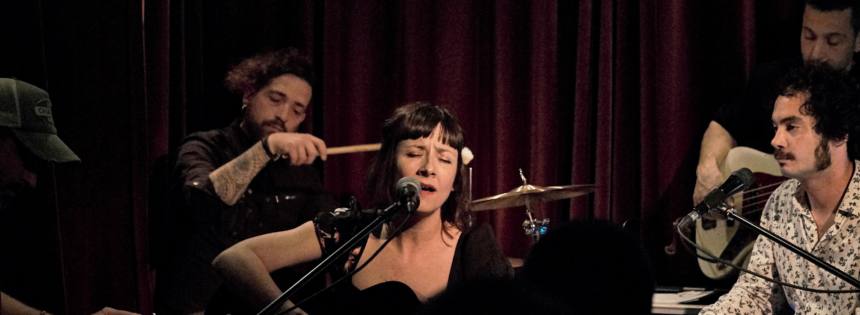
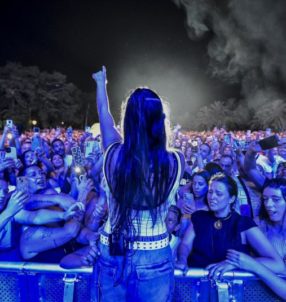
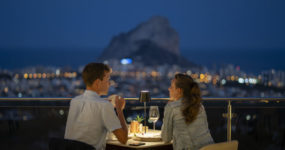
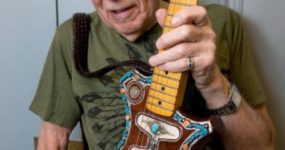
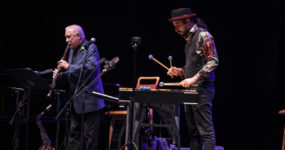
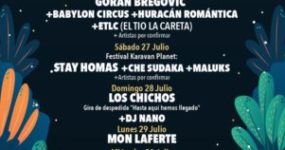

















Leave a comment